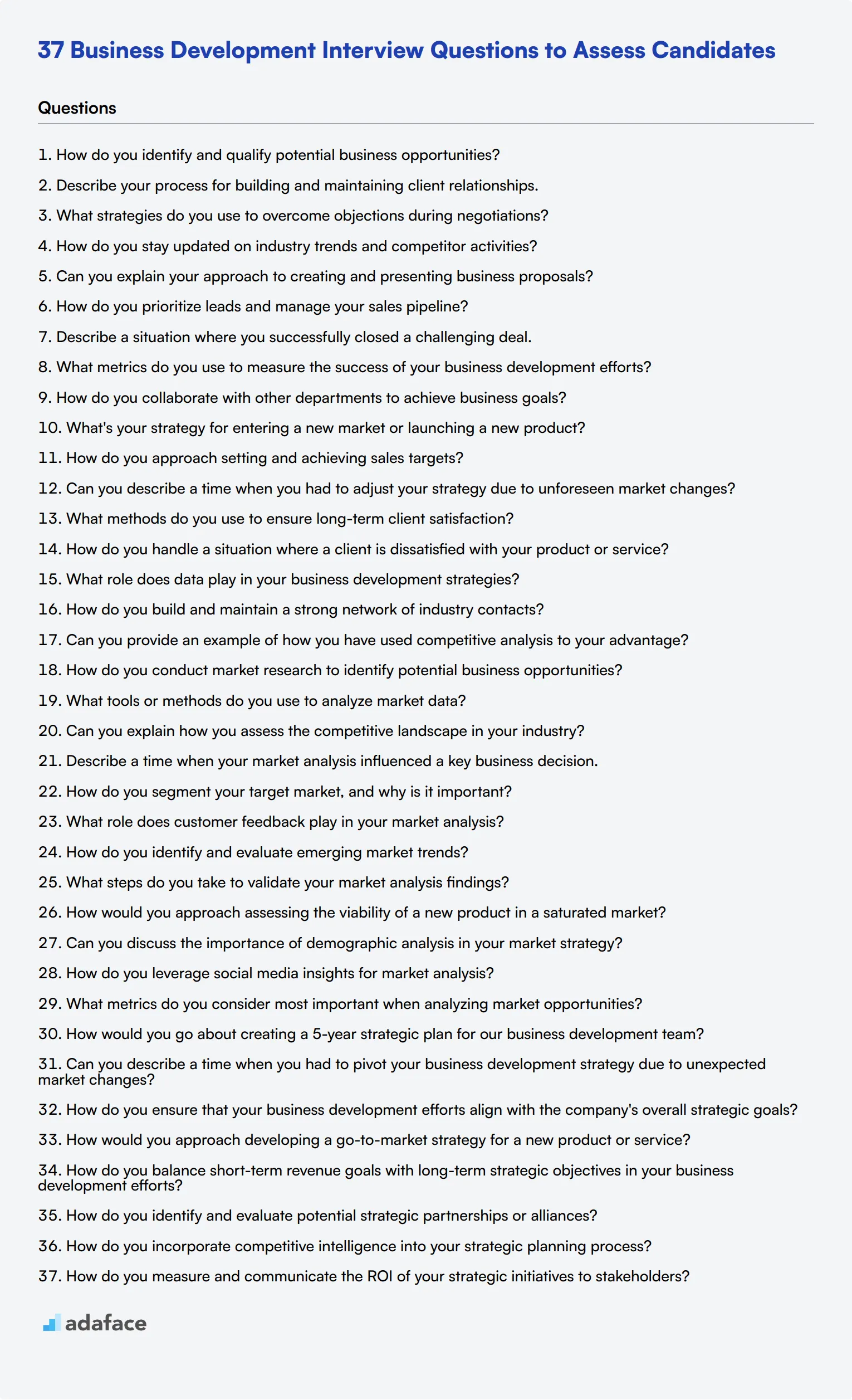Interviewing candidates for business development roles can be challenging, especially when identifying who has the right mix of skills and experience. This list of questions will help you streamline the process and find top talent, just like our approach for a Business Development Coordinator.
In this blog post, we provide a comprehensive set of interview questions tailored to various levels of experience in business development. These questions are grouped into categories such as basic inquiries, junior executive evaluations, market analysis, and strategic planning.
By using this list, you can better assess the capabilities and suitability of your candidates, ensuring you hire the best fit for your team. For a more thorough evaluation, consider pre-screening candidates with our Business Development Test before conducting interviews.
Table of contents
10 basic Business Development interview questions and answers to assess applicants
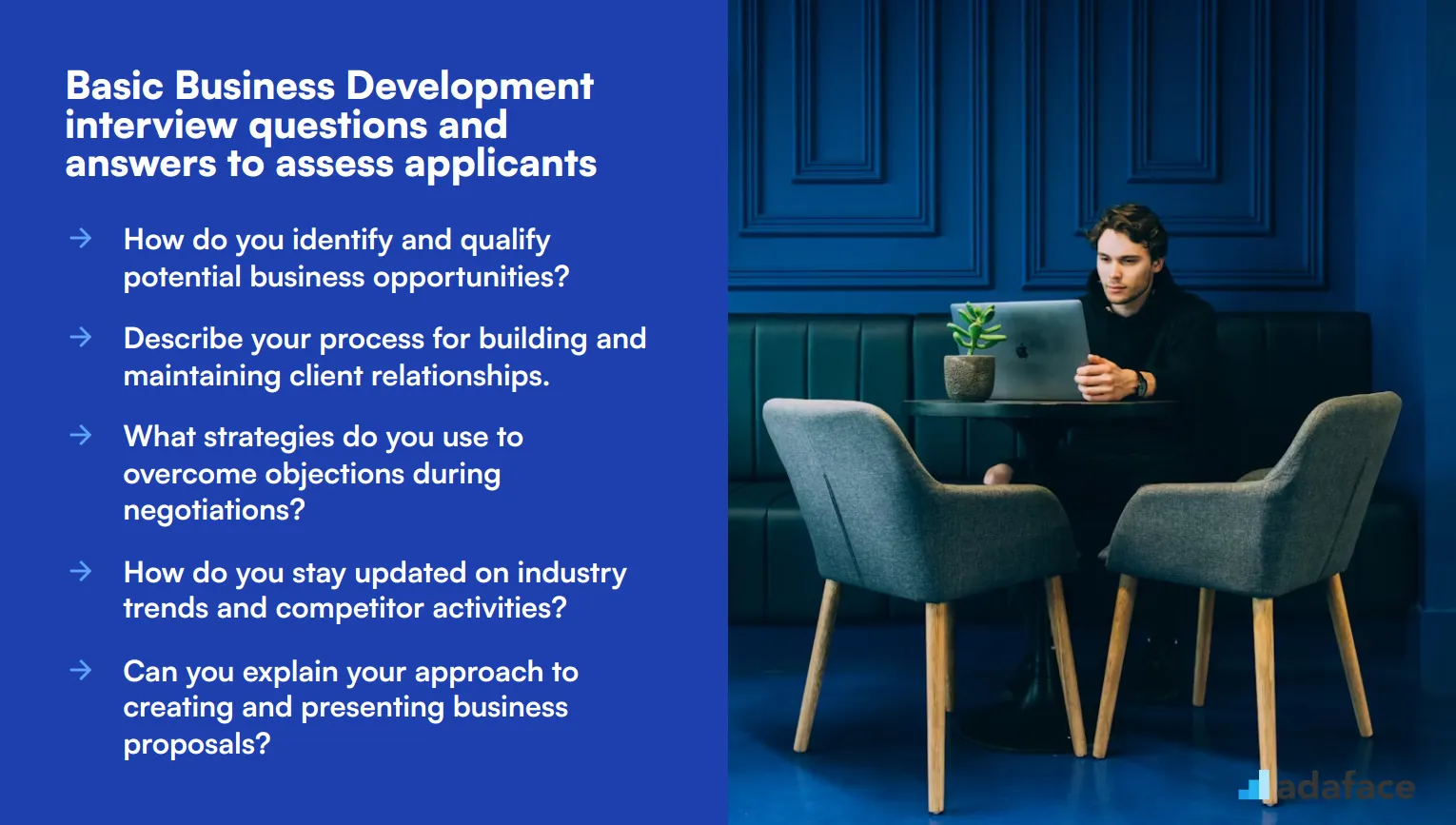
To assess candidates for business development roles effectively, use these 10 basic interview questions. These questions help evaluate a candidate's understanding of core business development concepts and their ability to apply them in real-world scenarios.
- How do you identify and qualify potential business opportunities?
- Describe your process for building and maintaining client relationships.
- What strategies do you use to overcome objections during negotiations?
- How do you stay updated on industry trends and competitor activities?
- Can you explain your approach to creating and presenting business proposals?
- How do you prioritize leads and manage your sales pipeline?
- Describe a situation where you successfully closed a challenging deal.
- What metrics do you use to measure the success of your business development efforts?
- How do you collaborate with other departments to achieve business goals?
- What's your strategy for entering a new market or launching a new product?
7 Business Development interview questions and answers to evaluate junior executives
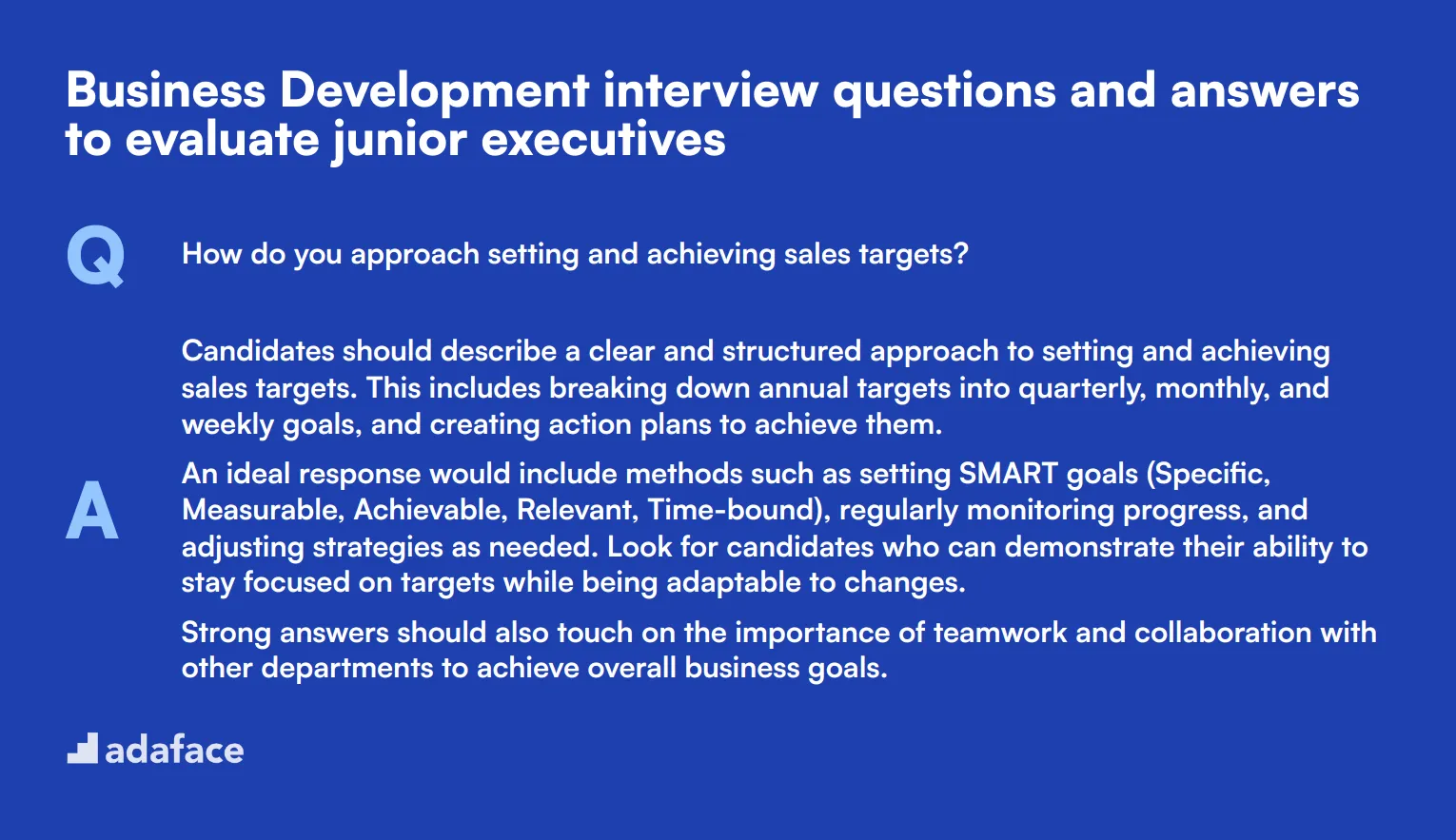
To effectively evaluate junior executives in business development, it's crucial to ask the right questions. The following interview questions will help you assess candidates' skills, strategies, and mindset, ensuring you find the best fit for your team.
1. How do you approach setting and achieving sales targets?
Candidates should describe a clear and structured approach to setting and achieving sales targets. This includes breaking down annual targets into quarterly, monthly, and weekly goals, and creating action plans to achieve them.
An ideal response would include methods such as setting SMART goals (Specific, Measurable, Achievable, Relevant, Time-bound), regularly monitoring progress, and adjusting strategies as needed. Look for candidates who can demonstrate their ability to stay focused on targets while being adaptable to changes.
Strong answers should also touch on the importance of teamwork and collaboration with other departments to achieve overall business goals.
2. Can you describe a time when you had to adjust your strategy due to unforeseen market changes?
Candidates should provide an example of a specific situation where they had to pivot their strategy due to unexpected market conditions. This could include changes in customer behavior, economic shifts, or new competitors entering the market.
An ideal response would detail how they identified the change, the steps they took to adjust their strategy, and the outcome of those adjustments. Look for candidates who show flexibility, quick thinking, and the ability to stay calm under pressure.
Assess their ability to gather and analyze relevant data to make informed decisions, and how they communicate these changes to their team and stakeholders.
3. What methods do you use to ensure long-term client satisfaction?
Candidates should discuss strategies such as regular check-ins, personalized service, and proactive problem-solving to ensure long-term client satisfaction. Effective communication and understanding client needs are key components.
An ideal answer will include specific tools or processes they use, such as customer relationship management (CRM) systems, feedback surveys, and performance metrics. Look for candidates who emphasize the importance of building trust and maintaining open lines of communication.
You want to find individuals who show a commitment to customer success and have a track record of retaining and nurturing client relationships over time.
4. How do you handle a situation where a client is dissatisfied with your product or service?
Candidates should demonstrate a problem-solving mindset and a customer-first approach. They should explain steps such as listening to the client's concerns, empathizing with their situation, and taking swift action to address the issue.
An ideal response would involve describing a specific situation where they successfully resolved a client's dissatisfaction, the actions they took, and the positive outcome. Look for candidates who can maintain professionalism and composure, even in challenging situations.
Evaluating their ability to turn a negative experience into a positive one and retain the client's business is crucial.
5. What role does data play in your business development strategies?
Candidates should highlight the importance of data-driven decision-making in their business development strategies. This includes using data to identify opportunities, track performance, and optimize processes.
An ideal answer will mention specific tools or software they use for data analysis, such as CRM systems, market research tools, and performance dashboards. Look for candidates who can demonstrate a solid understanding of key metrics and how they impact business outcomes.
It's essential to find individuals who can not only collect data but also interpret it effectively to make informed decisions that drive growth.
6. How do you build and maintain a strong network of industry contacts?
Candidates should discuss strategies such as attending industry events, participating in online forums, and leveraging social media platforms like LinkedIn to build and maintain a strong network of contacts.
An ideal response would include examples of how they have successfully used their network to generate leads, gain insights, and collaborate on opportunities. Look for candidates who emphasize the importance of genuine relationships and mutual benefit.
Find individuals who are proactive in their networking efforts and understand the long-term value of a robust professional network.
7. Can you provide an example of how you have used competitive analysis to your advantage?
Candidates should explain how they conduct competitive analysis to understand their market position, identify strengths and weaknesses, and uncover opportunities for differentiation.
An ideal answer will include a specific example of a time they used competitive analysis to make strategic decisions, such as adjusting their value proposition or improving their product offerings. Look for candidates who demonstrate the ability to think critically and strategically.
Evaluating their approach to staying updated on competitor activities and their ability to use this information to drive business success is key.
12 Business Development questions related to market analysis
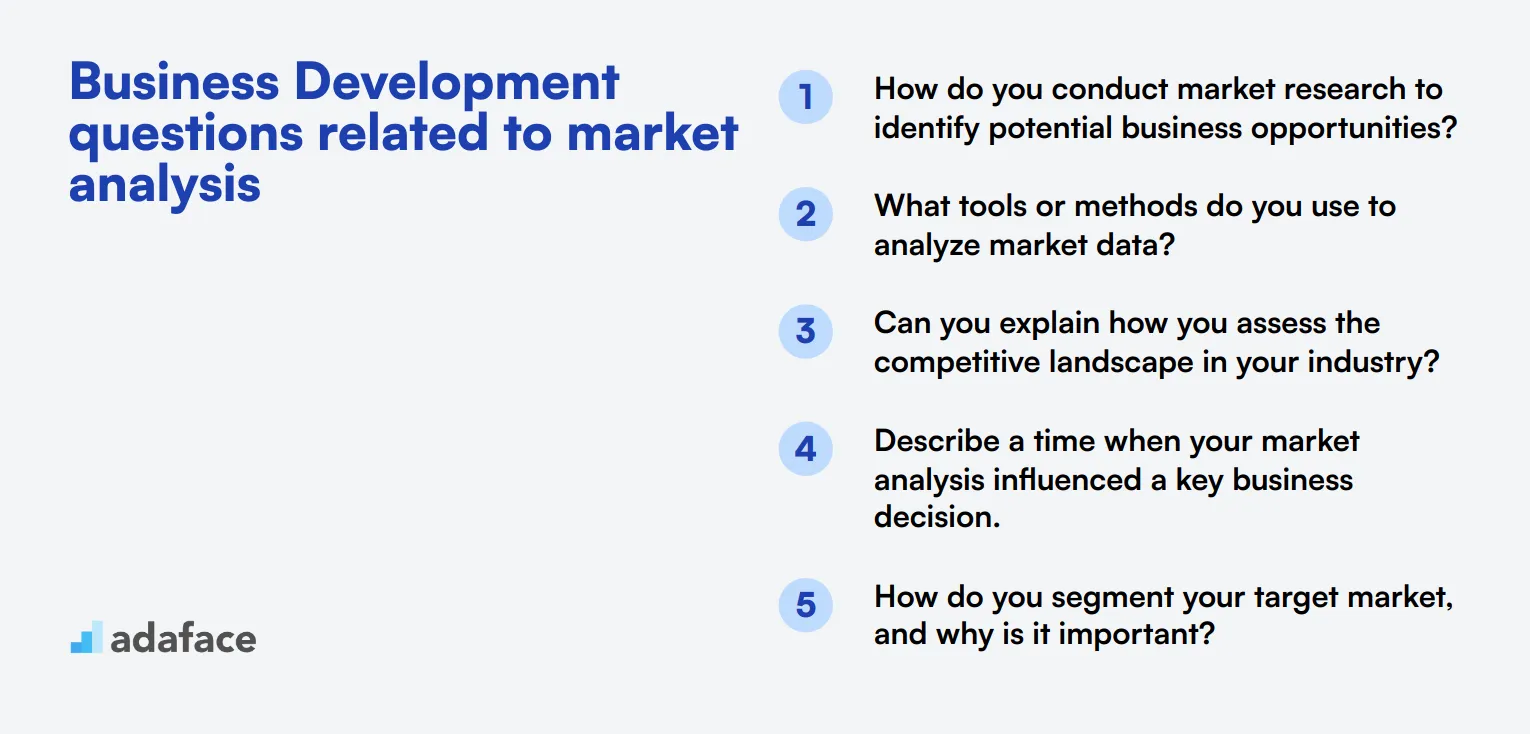
To assess candidates’ abilities to analyze market trends and identify opportunities, consider using this set of questions. They can help reveal the applicant's analytical skills and strategic thinking, which are crucial in business development roles. For more insights into job roles, check out this business development coordinator job description.
- How do you conduct market research to identify potential business opportunities?
- What tools or methods do you use to analyze market data?
- Can you explain how you assess the competitive landscape in your industry?
- Describe a time when your market analysis influenced a key business decision.
- How do you segment your target market, and why is it important?
- What role does customer feedback play in your market analysis?
- How do you identify and evaluate emerging market trends?
- What steps do you take to validate your market analysis findings?
- How would you approach assessing the viability of a new product in a saturated market?
- Can you discuss the importance of demographic analysis in your market strategy?
- How do you leverage social media insights for market analysis?
- What metrics do you consider most important when analyzing market opportunities?
8 Business Development interview questions and answers related to strategic planning
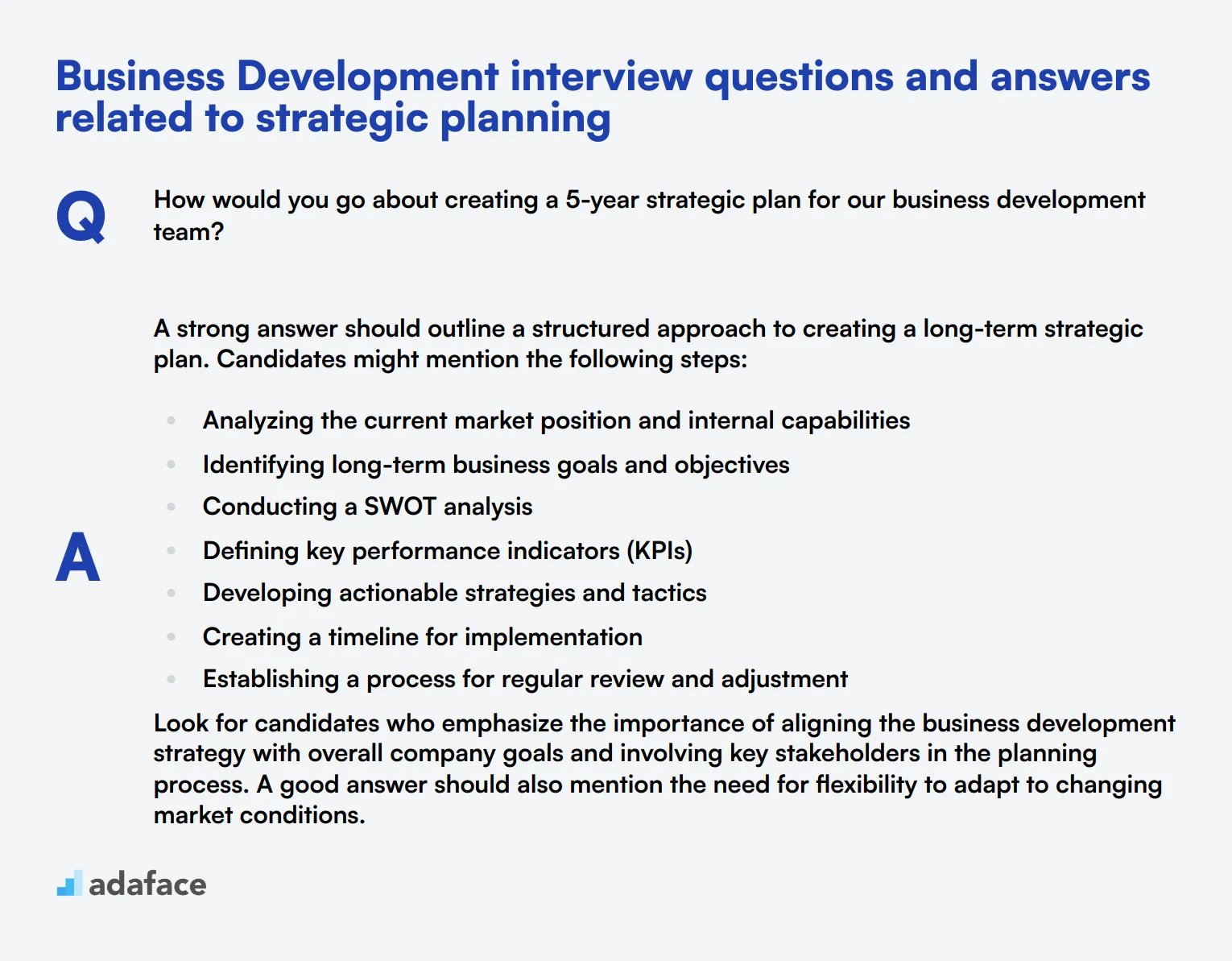
Strategic planning is the backbone of successful business development. These questions will help you gauge a candidate's ability to think strategically and align business development efforts with overall company goals. Use this list to assess skills and identify top-notch strategists who can drive your organization forward.
1. How would you go about creating a 5-year strategic plan for our business development team?
A strong answer should outline a structured approach to creating a long-term strategic plan. Candidates might mention the following steps:
- Analyzing the current market position and internal capabilities
- Identifying long-term business goals and objectives
- Conducting a SWOT analysis
- Defining key performance indicators (KPIs)
- Developing actionable strategies and tactics
- Creating a timeline for implementation
- Establishing a process for regular review and adjustment
Look for candidates who emphasize the importance of aligning the business development strategy with overall company goals and involving key stakeholders in the planning process. A good answer should also mention the need for flexibility to adapt to changing market conditions.
2. Can you describe a time when you had to pivot your business development strategy due to unexpected market changes?
An ideal response should demonstrate the candidate's ability to adapt quickly and think critically in challenging situations. They might describe a scenario such as:
- Identifying the unexpected market change (e.g., new competitor, economic downturn, technological disruption)
- Quickly assessing the impact on current strategies
- Gathering data and insights to inform a new approach
- Collaborating with team members and stakeholders to develop alternative strategies
- Implementing the new strategy and monitoring its effectiveness
Pay attention to how the candidate balances quick decision-making with thorough analysis. Look for examples of creative problem-solving and the ability to rally a team around a new direction. The best answers will also include lessons learned from the experience.
3. How do you ensure that your business development efforts align with the company's overall strategic goals?
A strong candidate should emphasize the importance of cross-functional collaboration and regular communication with leadership. They might mention strategies such as:
- Regularly attending company-wide strategy meetings
- Maintaining open lines of communication with C-level executives
- Aligning business development KPIs with overall company objectives
- Conducting periodic reviews to ensure alignment
- Collaborating with other departments (e.g., marketing, product development) to ensure cohesive efforts
Look for answers that demonstrate a holistic understanding of the business and the ability to think beyond just sales numbers. The ideal candidate should show they can act as a strategic partner to the executive team, contributing to and executing on the company's vision.
4. How would you approach developing a go-to-market strategy for a new product or service?
An effective answer should outline a comprehensive approach to launching a new offering. Key elements might include:
- Conducting thorough market research to identify target customers and competitors
- Collaborating with product teams to understand unique selling propositions
- Developing customer personas and mapping the buyer's journey
- Creating a pricing strategy
- Identifying appropriate marketing channels and messaging
- Planning a phased rollout strategy
- Establishing metrics to measure success
Look for candidates who emphasize the importance of cross-functional collaboration, especially with product managers and marketing teams. The best answers will also mention the need for flexibility and continuous optimization based on early market feedback.
5. How do you balance short-term revenue goals with long-term strategic objectives in your business development efforts?
A strong response should demonstrate the candidate's ability to think both tactically and strategically. They might discuss:
- Setting a mix of short-term and long-term goals
- Prioritizing opportunities that align with both immediate needs and future objectives
- Developing a pipeline that includes quick wins and longer-term, high-value prospects
- Regularly reviewing and adjusting the balance based on company needs and market conditions
- Educating stakeholders on the importance of balancing short-term and long-term focus
Look for candidates who can articulate the importance of meeting current revenue targets while also building a foundation for future growth. The best answers will include specific examples of how they've successfully managed this balance in past roles.
6. How do you identify and evaluate potential strategic partnerships or alliances?
An ideal answer should outline a systematic approach to identifying and assessing potential partners. Key points might include:
- Conducting market research to identify companies with complementary offerings or capabilities
- Analyzing potential partners' financial health, reputation, and strategic goals
- Evaluating the potential synergies and value creation opportunities
- Assessing cultural fit and alignment of business practices
- Conducting due diligence on legal and regulatory considerations
- Developing a clear value proposition for both parties
Look for candidates who emphasize the importance of strategic fit over short-term gains. The best answers will also mention the need for clear communication and alignment of expectations throughout the partnership evaluation and formation process.
7. How do you incorporate competitive intelligence into your strategic planning process?
A strong response should demonstrate the candidate's ability to gather and utilize competitive intelligence effectively. They might mention:
- Regularly monitoring competitors' activities, product offerings, and marketing strategies
- Utilizing tools and databases for market and competitor analysis
- Gathering insights from sales teams, customers, and industry events
- Conducting SWOT analyses to identify competitive advantages and weaknesses
- Incorporating competitive insights into product development and positioning strategies
- Regularly updating and sharing competitive intelligence with relevant stakeholders
Look for candidates who understand the importance of ongoing competitive analysis rather than treating it as a one-time exercise. The best answers will also discuss how they use competitive intelligence to identify market opportunities and inform strategic decisions.
8. How do you measure and communicate the ROI of your strategic initiatives to stakeholders?
An effective answer should demonstrate the candidate's ability to quantify and articulate the value of their strategic efforts. Key points might include:
- Establishing clear, measurable KPIs aligned with business objectives
- Implementing systems to track and analyze relevant data
- Calculating both direct (e.g., revenue growth) and indirect (e.g., brand value) ROI
- Creating regular reports and dashboards for stakeholders
- Presenting ROI in context of overall business goals and market conditions
- Using data visualization techniques to make complex information accessible
Look for candidates who emphasize the importance of not just measuring ROI, but effectively communicating it to different audiences. The best answers will also mention how they use ROI data to continuously improve and optimize their strategies.
Which Business Development skills should you evaluate during the interview phase?
Evaluating business development skills during an interview is challenging, as no single interview can cover every aspect of a candidate's capabilities. However, focusing on core skills can provide valuable insights into their potential to succeed in a business development role.
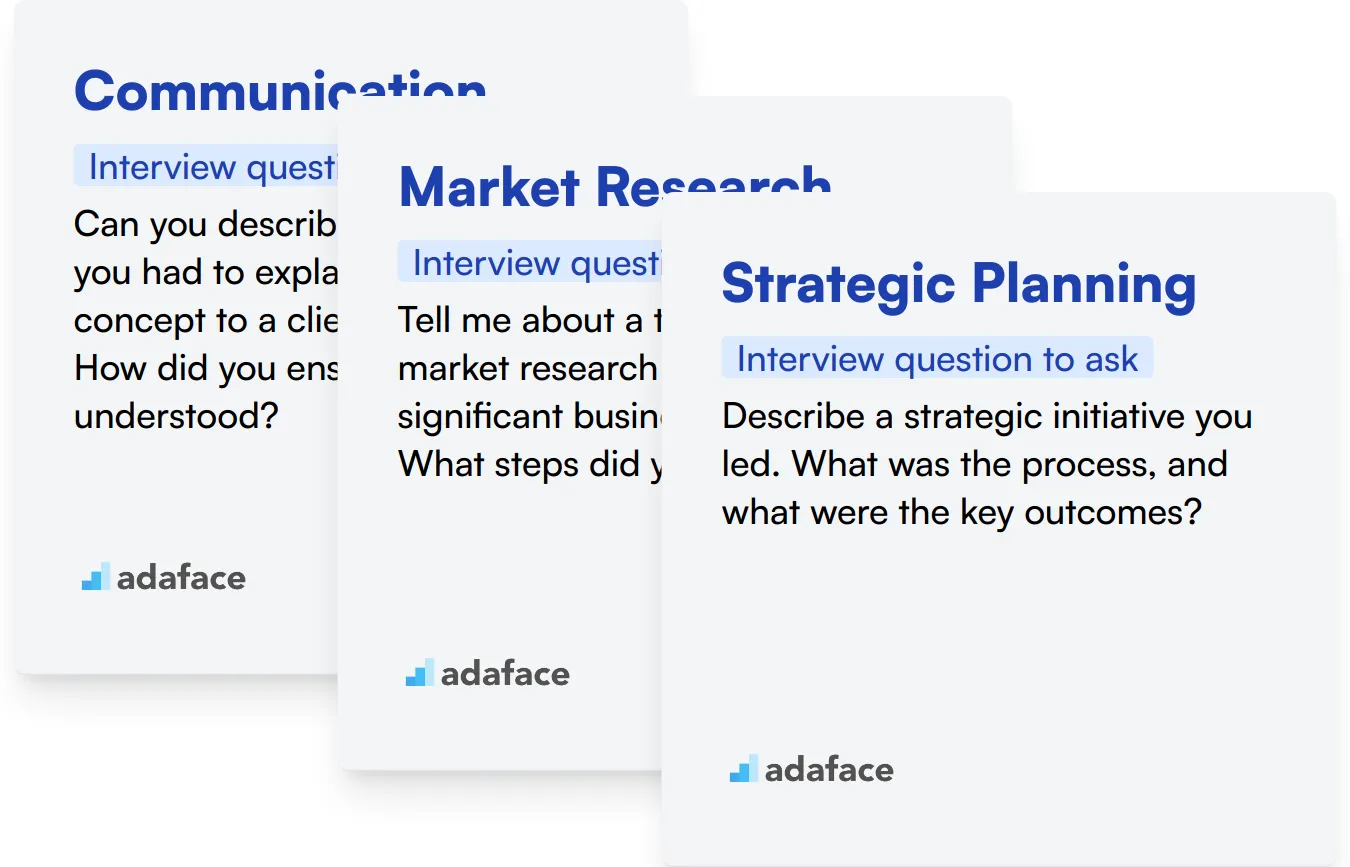
Communication
Effective communication is crucial in business development as it ensures clear messaging to potential clients and internal stakeholders. Whether it's pitching ideas or negotiating deals, strong communication skills are indispensable.
You can use an assessment test that includes relevant multiple-choice questions to evaluate a candidate's communication skills. Our library offers a customer-service-test that can help identify these skills.
Additionally, targeted interview questions can help assess a candidate's communication abilities.
Can you describe a time when you had to explain a complex concept to a client or colleague? How did you ensure they understood?
Look for responses that demonstrate clarity, the ability to break down complex ideas, and the use of examples or analogies to aid understanding.
Market Research
Market research skills are essential for identifying market opportunities and understanding competitive dynamics. This skill helps in formulating strategies that align with market needs.
Consider using a market-analysis-test to filter out candidates with strong market research capabilities. Our marketing-analysis-test covers essential aspects of market research.
You can also ask specific questions during the interview to gauge their market research expertise.
Tell me about a time when your market research led to a significant business opportunity. What steps did you take?
Look for candidates who demonstrate a logical approach to research, use of data to support findings, and the ability to translate research into actionable business strategies.
Strategic Planning
Strategic planning is pivotal in setting long-term goals and determining the direction of business growth. It ensures that resources are efficiently allocated and that the company is prepared for future challenges.
To assess strategic planning skills, an assessment test dedicated to business development can be useful. Our business-development-test includes questions that highlight strategic thinking.
Targeted interview questions can also help reveal a candidate's strategic planning abilities.
Describe a strategic initiative you led. What was the process, and what were the key outcomes?
Seek answers that outline a clear process, demonstrate foresight, and show how the initiative aligned with the company's overall goals and resulted in measurable outcomes.
3 Tips for Effectively Using Business Development Interview Questions
Before you start implementing what you've learned about Business Development interviews, here are some crucial tips to enhance your process.
1. Implement Skills Tests Before Interviews
Using skills tests before interviews can help you identify candidates with the right capabilities. Tools like the Business Development Test and the Sales Aptitude Test assess relevant skills directly related to the role.
These tests provide quantifiable results, allowing you to filter candidates effectively based on their actual performance rather than just resumes. This not only saves time but also sets a baseline for what to expect during the interview.
By starting your evaluation with practical tests, you can focus your interview questions on deeper insights, making for a more effective conversation.
2. Outline Relevant Interview Questions
Time is limited during interviews, so selecting the right questions is key to evaluating candidates effectively. Focus on questions that reveal insights about their skills, experience, and fit for your organization.
Additionally, consider incorporating questions related to traits like communication and problem-solving. For instance, you might explore behavioral questions or tests like the Behavioral Interview Questions to gauge how they handle real-world situations.
A well-curated set of questions ensures that you can assess the most crucial aspects of a candidate's fit for the role while maximizing the value of each interview.
3. Ask Follow-Up Questions
Simply relying on initial questions can lead to superficial responses from candidates. Follow-up questions are essential to uncover deeper insights and verify the authenticity of their answers.
For example, if a candidate states they increased sales by 20%, a good follow-up question would be, 'Can you explain the strategies you implemented to achieve that?' This probes for more detail and helps you understand their approach and thought process.
Use Business Development interview questions and skills tests to hire talented candidates
When hiring for roles that require strong Business Development skills, it's important to accurately assess these competencies. One of the most efficient ways to do this is through skills tests. You can explore our relevant assessments like the Business Development Test for an effective evaluation.
After utilizing this test, you can shortlist the best candidates and invite them for interviews. To get started, visit our online assessment platform and sign up to streamline your hiring process.
Business Development Test
Download Business Development interview questions template in multiple formats
Business Development Interview Questions FAQs
Common questions include those related to market analysis, strategic planning, and basic business development concepts.
Ask specific questions about their experience with market research, data interpretation, and industry trends.
Evaluate their basic understanding of business concepts, eagerness to learn, and ability to support senior team members.
These questions help determine a candidate's ability to formulate and implement effective business strategies.
Combine interview questions with skills tests to get a comprehensive understanding of the candidate's abilities.
Be clear about the role's requirements, tailor questions to specific skills, and use answers to gauge problem-solving and strategic thinking abilities.

40 min skill tests.
No trick questions.
Accurate shortlisting.
We make it easy for you to find the best candidates in your pipeline with a 40 min skills test.
Try for freeRelated posts
Free resources




